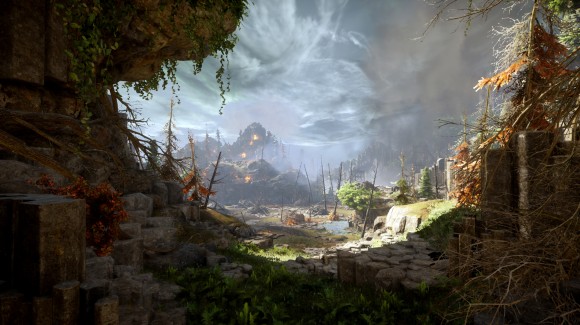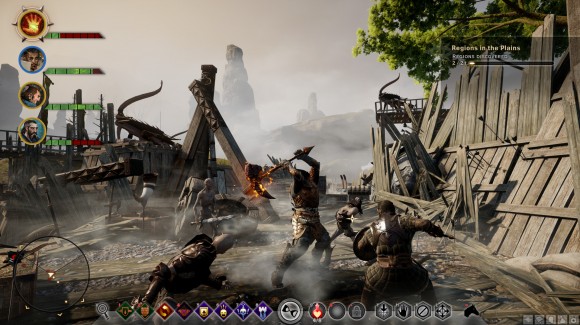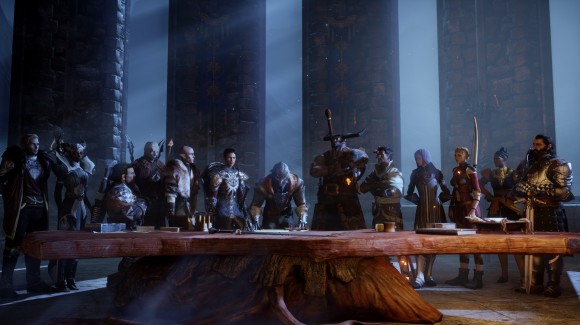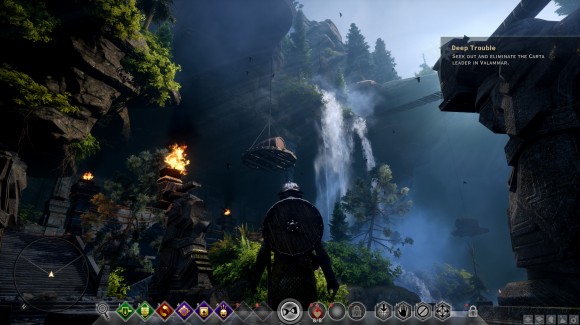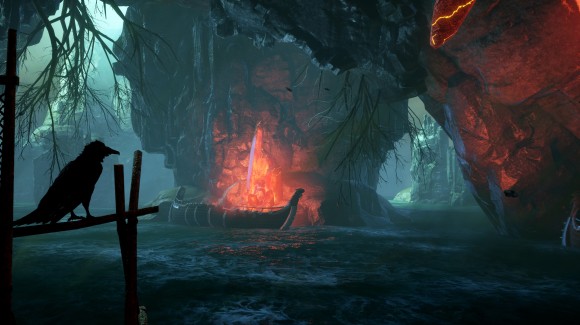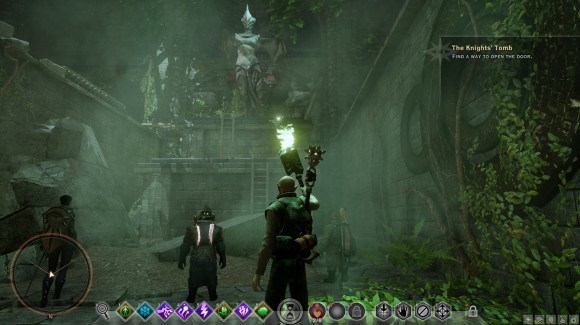The original Dragon Age: Origins was a rather unique title for its time – It was a touch of RPG in the classic Western vein built around new sensibilities and even though it released a full two years after Mass Effect it was still a time where story-driven games and player choice were largely mutually exclusive. It was a game where many of the best things about open-ended RPGs came together to create an experience with a lot of freedom and choice, but still told a satisfying story that was affected by those choices. I will always have a soft spot for Origins if for no other reason than it allowed me to interrupt a lot of normal conversations by unexpectedly stabbing a guy to death. Dragon Age 2 came out and suggested that Bioware was completely unaware of all the good aspects of the original, rather opting to give us a sloppy version of Mass Effect with dragons. Among the game’s many deep flaws, perhaps most grievous was the almost mocking absence of real choice – The game rarely gave you a real say in the story, and even when it did almost none of it mattered. Now Dragon Age: Inquisition brings our loosely-connected story arc to a close and it seems that Bioware has learned from their mistakes. Unfortunately, in true Bioware fashion, Inquisition comes to us with a litany of new problems, offering a game that often feels confused and lacking in direction, but overall does manage to summon enough of the charm and fun of Bioware games to be an enjoyable, if underwhelming, end to the Dragon Age trilogy.
First off, the game starts out on a high note by allowing you to choose your character’s race again, a feature whose absence was definitely felt in Dragon Age 2. This time around you not only have the option of choosing from the classic human, elven and dwarven races, but also Dragon Age‘s original race of towering, gray-skinned warrior people, the Qunari. You can also choose a class from warrior, rogue or mage, which combined with your race determines your character’s background. While you don’t get the opening storyline missions which I really loved in Origins, I was very pleased to see all the options have returned. That said, I still ended up making a noble human warrior. While your choices of class and race don’t seem to make a huge difference in terms of how the story plays out, they do add little touches in terms on dialogue and a few missions which you can take on throughout the game, which goes a long way to making the story feel more like your own.
Inquisition returns you to the land of Thedas, taking place not too long after Dragon Age 2. The tensions between the Mages and the Templars have finally reached a breaking point, resulting in an all out war between the two factions. The Chantry has called a conclave to try to broker a piece between the two when a massive explosion rips a hole in the Fade, loosing demons into the corporeal world. Your character gets caught up in the explosion but mysteriously survives, exiting the Fade with a cryptic glowing mark on your left hand. The mark is the key to closing the Fade rifts, but there’s more afoot that simply demons. Under the banner of the Inquisition, Dragon Age will have you raise an army and strike against the dark forces behind this disaster. Along the way you must choose to side with the mages or Templars, stop sinister assassination plots, have a little romance and even fight a few dragons.
Speaking of slaying things, Inquisition will have you drawing your swords and staffs quite a bit. The game’s battle system is not much more refined that that of the DA2, having you hold down a single button to make your regular attack continuously. You and your team will learn various combat abilities which you can use to do extra damage, knock down enemies, defend yourself, etc. which are all tied to hot keys. Also similar to DA2 I found myself going through most of the game just holding down the attack button, waiting for my abilities to cool down, using them, and repeating. There can be a little complexity within battles, with flanking being one of the most useful tactics, but for the most part I found the combat fairly vapid. There is the option to stop combat and view the battlefield from a birds eye view, which would allow you to strategically plan the course of battle, but I never found that to be something I needed to do. Your companions all carry themselves fairly competently and don’t require much management, and while sometimes the battles can get pretty harried, I found myself falling into a pretty predictable routine for every engagement. I think the tactically-minded player may be able to get a little fun out using more strategy, but I can’t imagine wanting to draw out the games numerous, numerous battles any longer than I have to. Which segues into another complaint which is that there are a lot of enemies which seem to take forever to kill while you mindless pound on them. This quickly contributed to a sense of blase in even some of the game’s biggest battles; even the final boss of the game didn’t feel especially tense or challenging. This is a bad thing because you’re going to be fighting so much. I will give credit to the dragon fights, which feel pretty exciting if only for just how big the enemy is; these were some of the few times I felt excited for battle, even if it still fell into the same patterns as the rest of the game. And really, in the long run, I’m not playing Dragon Age for the combat, but given what a large percent of the game it is, the overall monotonous nature of it can often feel like a long chore in between the games more exciting elements.
The game boasts over 100 hours of gameplay, which is easily true, but nowhere near as appealing as you would think. Inquisition subscribes to an almost World of Warcraft mindset about content, with numerous quests sending you out into Thedas to kill X number of monsters and gather Y number of resources, making a sizable portion of the game feel more like padding than fun. While the opening world area, the generic Hinterlands may be the worst offender, every sequential area is also mostly made up of large chunks of predictable fetch quests. Per promise, the world is indeed huge and unique, but even this isn’t doing the game any favors. First off, while the game allows you to “go off the path”, there are a lot of invisible walls to encounter, and perhaps more frustrating, many of the locations you are going to want to get to on the map have one access point, with a path of unscalably steep canyon walls to keep you from getting there any other way. This gets to be a pretty big annoyance when you need to storm the hundredth bandit encampment for a quest but have to walk all the way around a giant mountain to find the way in. The game now has a cheap jump mechanic, and I say cheap because the only use I can find for it is to make it possible to hop up the side of a hill when it’s not quite climbable. You also get a mount, but the horse barely feels any faster than moving on foot. Overall, the world, while large and gorgeous, usually feels hollow.
While my overall experience was fairly playable, the game did hit some occasional glitches that were pretty noticeable. The most common seemed to be lines of dialogues which didn’t trigger and could only be skipped over, missing whatever content they may have contained. I also experienced a few instances of characters who didn’t spawn, both during gameplay and in cut scenes, which causes their lines not be read during dialogue. One instance of a missing NPC left my Inquisitor and his eight-foot tall Qunari companion watching the seashore, staring at each other in silence and smiling awkwardly. Only when they failed to embrace each other and start making out did I realize something had gone wrong. Lucio, who played the game on the 360 had several more grievous instances of similar issues, including one which prevented him from proceeding in an essential story mission. While I didn’t encounter any problems that great, you can only imagine how much fun it is to find that you can’t complete a game you’ve already invested fifty hours in.
For fans of Dragon Age or other Bioware games the premise to Inquisition is familiar territory – Recruit a team, raise an army and fight the unstoppable evil. Unique to Inquisition is the war table, where you charge your advisers with taking on different issues facing the Inquisition using their skills of diplomacy, espionage or military might. These missions don’t require anything of you as the player, they simply have a set time to complete and will reward you with little perks like gold or little story bits depending on who you assign the task to. War table missions can also unlock new quests for your character and open up new areas for you to explore. I actually felt like this is one of the more intriguing aspects of the game, but it ended up playing too simply for my tastes. You only ever have three advisers, each of whom can only be engaged in one mission at a time, some requiring over a day of real time to complete. I would have liked to see this element fleshed out more. In fact, you’ll find that many of the best parts of the game did not get as much attention as you would hope. At one point you gain the ability to hand out judgement over prisoners of the Inquisition, hearing their crimes and their defenses and deciding their punishments. These are quick exchanges, but they’re one of the most satisfying parts of the game. Sadly you only get to do this a small handful of times throughout the course of the game.
As you progress through the game you will raise the Inquisitor’s Power and Influence stats. Power is basically a measure of how much you have accomplished and you will need to acquire certain amounts of it before being able to progress the game’s main story or unlock additional areas on the map. Even without completing a lot of the game’s missions I never felt like the Power stat was holding me back from progressing at the speed I wanted, so it’s never much of an issue. Influence is used to gain Inquisition Perks, which give you little bonuses like more dialogue options, better rewards and more rare and useful items in stores. You gain influence mostly by completing quests and again, it never felt like it was holding me back from playing the game, though I came to realize some perks like extra dialogue options and the ability to unlock more doors were a lot more valuable than a 5% discount at merchants. Still I can’t say they added a whole lot to the game. They’re certainly more realized systems than Mass Effect 3‘s Readiness stat, but for how important the game seems to want to present them, overall they feel kind of arbitrary and meaningless. To Bioware’s defense however, if you’re like me and not too crazy about doing a lot of the game’s quests, you can still progress through the game and get the most meaningful perks without having to do too much grinding.
But enough about swords and scrolls, what I suspect what many players are coming to Inquisition for is the story, told in the Bioware’s signature style of choice-based adventures. Being the hero chosen to reunite Thedas in peace and vanquish a demon army puts you in the familiar position of a leader who commands great power, leaving you to make sweeping changes and solve grand problems. You won’t be alone in your quest though, as the Inquisitor will gather a diverse group of companions who will follow you into battle, from Cockney bandit girls and grandiose enchantresses to boisterous Qunari warriors and austere Grey Wardens and even DA2’s wisecracking Dwarven storyteller Varric. There are nine potential companion characters, and Inquisition does a much better job than before in providing more varied cast to suit your Inquisitor. Want to be a pious and noble warrior? You can find a like-minded team of champions to aid you. Want to be a brutal and violent tyrant? Well, the game won’t let you. But you can still be pretty nasty, and you can assemble a crew who will back you up, too. Your war council, consisting of a military adviser, chief diplomat and Leiliana of Origins as your spymaster, also play a large part in your story, offering advice and requesting guidance as well, providing friendship and even some romantic opportunities. The cast of characters may be one of the game’s strongest points, providing a pretty wide variety of personalities and viewpoints. On top of that the game offers an ample number conversations you can have with each character, with new talks unlocking as the story progresses, giving you plenty of time to build the kind of respect and friendship you want from Bioware games even with characters whom you only met in this game. But not quite everything is right this time around…
While Inquisition’s cast of characters is far better than DA2, and may be even better than Origins, and many of the best moments in the games are interactions spent with your team members, after three Mass Effects and three Dragon Ages, Bioware’s dialogue is starting to wear pretty thin. Dragon Age 2 liked to get out-of-character and often times presented incongruous situations where you’re in the middle of serious and horrible situations while your team is making puns and acting lovably unconventional. Inquisition doesn’t quite fall into the same pitfall of self-satisfied joking, but a lot of the conversations that were supposed to be “charming” were more likely to make me roll my eyes than feel affectionate towards the cast. I think the writers have driven the “Say something profound or serious and then follow it up with a low-key, quirky remark” bit pretty deep into the ground and Inquisition fires them off one after another. Perhaps I’m the minority here, but it started to come off as corny, to the point that sometimes I can’t remember if I’m playing a medieval fantasy RPG or watching an episode of Friends set in the Dark Ages. One of my favorite characters to speak with was the Grey Warden Blackwall because every branch of his dialogue tree didn’t end with a with a cutesy afterthought. This is a fairly minor grievance, but by the end of the game the sheer volume of whimsy had driven itself pretty deep under my skin.
On the contrary, love is alive and well in Inquistion, and it feels like Bioware has made some course corrections on the progressively laughable and awkward romantic subplots for their leads. As the Inquisitor you have the option of the hitting on just about every other character in the game, but not everyone is going to tear their armor off at the sight of you just because you’re the main character. Bioware has pulled some of the spotlight off of the romantic subplots and I think this helps a lot to make them less ridiculous. It’s no real challenge to seduce your chosen beau other than choosing the romantic dialogue option every time (Although most of the characters have a preferred gender and even race which they will agree to be romanced by), but at least in my romance with Josephine the ambassador I felt it added a satisfying element which fleshed out my character’s story. It was a minor arc, accompanied by an enjoyable subplot, but it’s easily the best romance I’ve seen from a Bioware game in a long time.
Choice has always been the real draw for me in Bioware games, and while Inquisition is something of a mixed bag, it does a better job that some others in making it feel like those choices matter. First, let me tell you the bad news: the game’s first act is largely a straight line that doesn’t give you much control over anything. Even the iconic dialogue wheel, which is starting to feel pretty stale at this point, mostly consigns you to three identical answers for every exchange, only allowing you choose how sarcastic and angry you will be while you agree to do whatever the plot wants you to. Perhaps due to the lack of ability to choose anything, the first third of the game is easily the worst, and combined with grinding fetch quests, is kind of a high hurdle to get over to get to the rest of the game. However it’s worth the effort, as once the story has been set up, you become the master of your own destiny, with a pretty good range of options and control and an impressive number of choices feeling like they are acknowledged in the course of the game. In fact, I think Inquisition may be the first game where too many of your choices matter, as sometimes even a simple dialogue between you and another character can become so chopped up to account for every variable that it breaks the flow. This is far from the worst thing that could happen, and after feeling like control has been wrested from my hands entirely in DA2, I can guarantee it’s far more satisfying to have a badly synchronized conversation about a decision of mine that changed the world, than it is to have a flowing one about how everything happened in spite of you. I think there’s at least one good replay to be mined from Inquisition, when playing as a new class and race, and making different choices, will show me a lot of the game which I didn’t see the first time.
Overall Inquisition has some issues in pretty much every aspect. Some are minor, others a little more fundamental, but while I find that I have more bad things to say about the game than good, I still put down the controller feeling pretty satisfied. The monotonous combat and overly large worlds can feel tedious, but I never felt like I couldn’t bear to continue, and even though the dialogue could wear on my nerves, I was still always pleased to return to my mountain fortress and find that companions had new topics to discuss and stories to explore. Not surprisingly, the best of part of this game is still the story and its characters. The joy of finding comfort, intrigue and friendship amongst your allies in dark times has always been what makes Bioware games so engaging to me and while Inquisition doesn’t quite find that sweet spot like some of their other titles, it still captures much of the same charm. So even though I have my criticisms, I still think there’s something there to be enjoyed by fans of other Bioware games.
After severely damaging their two biggest franchises Bioware feels less self-assured and more eager to please with Dragon Age: Inquisition. I think you can make the case that in trying so hard to please everyone they’ve made a game that’s probably not especially exceptional to anyone. Inquisition is a rough piece of work and clearly would have done better with some more focus and depth, but despite its issues I still walked away satisfied. I will replay it, perhaps a little wiser to what is and isn’t a good use of my time, and while parts of it will still annoy me, I believe I will still enjoy the experience. I’m giving this title a three, but consider it a high three. While you won’t need to rush out and pick up a copy, nor would I say you should pay full price, I feel that if you’ve ever enjoyed Bioware games or had a fondness for Dragon Age, you will find enough here to make it worth your time. With this trilogy brought to a close it is my hope that Bioware will look to new and fresh properties, hopefully having learned from their mistakes and not forgetting what makes their games so alluring to begin with. Despite my misgivings over the years, I will still come back for more.


